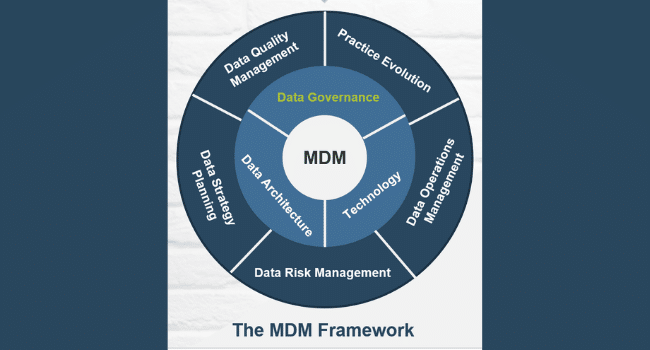Table of Contents
Do you own a business? Have you wondered how to organize your company data best? If so, then this article is for you.
This blog post will explore how an MDM framework can help your business organization. We’ll look at the benefits and drawbacks of using such a framework and some specific examples of when it would be appropriate to use one or more data governance pillar.
What is Master Data Management (MDM)?
At its core, MDM is a strategy for organizing and managing data. It’s a way to ensure that all of your company’s data is consistent, accurate, and up-to-date.
An MDM framework can help you achieve this by providing a centralized repository for all of your company data. This central location makes it easier to track down and fix errors and keep your data consistent across different applications and departments.
Types of MDM Frameworks
Hub-Based:
A hub-based MDM framework uses a central “hub” to store and manage data. This hub acts as a single point of contact for all data-related tasks.
The benefits of this approach include improved data quality and more manageable data sharing. However, it can be more expensive to implement, as you’ll need to purchase and maintain the central hub.
Federation-Based:
A federation-based MDM framework uses multiple distributed repositories to store data. This allows each application or department to maintain its copy of the data.
The benefits of this approach include more straightforward implementation and lower costs. However, it can lead to inconsistency in your company’s data if not managed properly.
Registry-Based:
A registry-based MDM framework uses a central repository to store metadata (information about data, such as its structure and meaning) instead of the actual data itself.
The benefits of this approach include improved data quality and more manageable data sharing. However, it can be more expensive to implement, as you’ll need to purchase and maintain the central registry.
When to Use an MDM Framework
There are many different situations in which an MDM framework can be helpful. For example, if you’re consolidating multiple databases into a single database, an MDM framework can help you ensure that all of your data is consistent across the different databases.
Another everyday use case is when you’re migrating to a new application or ERP system. In this situation, an MDM framework can help you ensure that all of your data is migrated correctly and consistently.
Finally, if you have multiple departments or business units that need to share data, and MDM framework can help you manage and coordinate this data sharing.
Benefits of Using an MDM Framework
There are many benefits to using an MDM framework, including improved data quality, more manageable data sharing, and reduced costs.
Improved Data Quality:
One of the main benefits of using an MDM framework is that it can help improve the quality of your company’s data. This is because an MDM framework provides a central repository for all your company’s data. This central location makes it easier to track down and fix errors and keep your data consistent across different applications and departments.
Easier Data Sharing:
Another benefit of using an MDM framework is that it can make sharing data between different departments or business units easier. This is because an MDM framework provides a central location for all your company’s data. This central location makes it easier for different departments or business units to access the data they need.
Reduced Costs:
A final benefit of using an MDM framework is that it can help reduce the costs of managing your company’s data. This is because an MDM framework provides a central repository for all your company’s data. This central location makes it easier to manage and maintain your data.
Final Thoughts
An MDM framework can be a valuable tool for managing your company’s data. It can help improve the quality of your data, make it easier to share data between different departments or business units, and reduce the costs of managing your data. If you’re looking for a way to improve the quality of your company’s data, an MDM framework may be the right solution for you.
Read more on KulFiy
image source- infotech.com
